https://www.middleeasteye.net/news/yemen-islah-members-react-outrage-uae-mercenary-report-1628186504
SANAA - They're supposed to be on the same side.
Since 2015, al-Islah, the Yemeni branch of the Muslim Brotherhood, and the United Arab Emirates have been fighting against Houthi rebels in an attempt to prop up the internationally recognised government of President Abd Rabbuh Mansour Hadi.
But on Tuesday, Buzzfeed revealed that the Emiratis had hired a team of American and Israeli mercenaries to assassinate members of the Islahi leadership - enraging the influential party and exposing the UAE's presence in Yemen to fierce criticism.
It has also placed Saudi Arabia, which leads an anti-Houthi coalition and is closely allied to both the Islahis and Emiratis, in a deeply uncomfortable position.
"Although the announced aim of the Emirates in Yemen is to support the legitimate government, it fights legitimacy with all its might," Issa Qadhi, a member of al-Islah in Taiz, told MEE.
Saudi Arabia is the leader of the coalition, so how it can keep silent against the UAE’s violations in Yemen?
- Mohammed Abdulwadood, al-Islah member
Instead of prioritising the defeat of the Iran-allied Houthi rebels, Qadhi said, "the UAE made the annihilation of the al-Islah party the first aim of its presence in Yemen".
"The UAE is willing to destroy the whole country and bring mercenaries from around the world to annihilate al-Islah," he added.
"The UAE is cunning but God does not help the cunning to succeed."
Questions for Riyadh
Abu Dhabi has long considered the Muslim Brotherhood an enemy, as has Saudi Arabia. However, Riyadh has decades-long ties with al-Islah, with the party an effective client throughout Ali Abdullah Saleh's 20-year rule of a united Yemen.
Together, the Saudis, Emiratis and Islahis were instrumental in seizing Aden and the surrounding area from the Houthi rebels, and gaining a strategic foothold in the country in mid-2015.
Since then, however, the UAE-Islah relationship has soured considerably, and in October 2017
clashes broke out in the southern city of Aden between Islahis and Emirati proxy militias.
In August, al-Islah's Aden branch issued a statement accusing unidentified "militias" of targeting the group since the beginning of the war in March 2015.
The statement notably listed the assassination of nine Islahi leaders, the arbitrary detention of four others, raids of the party’s headquarters on at least five occasions, and four raids of homes belonging to al-Islah leaders in Aden.
At the time, al-Islah had accused the UAE-backed Security Belt forces in Aden of being behind the raids and detentions, but not the assassinations.
Now the UAE have been exposed as ordering a team of American and Israeli mercenaries to kill al-Islah's Anssaf Ali Mayo - as well as everyone else in the office that was targeted, according to one of the mercenaries - the party are asking why its patron Riyadh is letting the assassinations happen.
"Saudi Arabia is the leader of the coalition, so how it can keep silent against the UAE’s violations in Yemen?” Mohammed Abdulwadood, an al-Islah member, told MEE. “I think Saudi Arabia is satisfied with the UAE's violations."
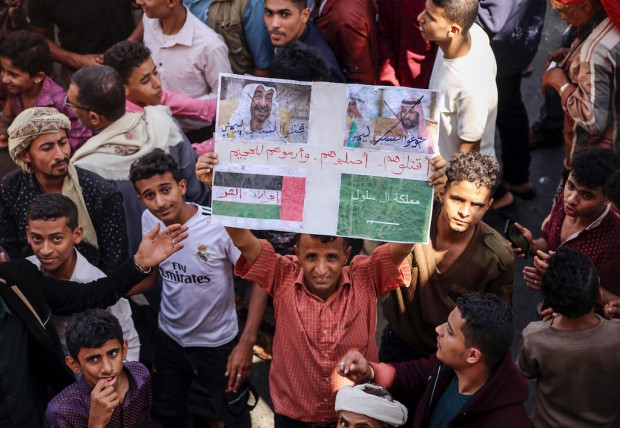 A Yemeni protester holds up a sign showing the crossed-out faces of the Saudi Crown Prince Mohamed bin Salman (R) and his Emirati counterpart Mohamed bin Zayed (L) with a caption in Arabic reading "kill them, cross them, cast them into hell" (AFP)
A Yemeni protester holds up a sign showing the crossed-out faces of the Saudi Crown Prince Mohamed bin Salman (R) and his Emirati counterpart Mohamed bin Zayed (L) with a caption in Arabic reading "kill them, cross them, cast them into hell" (AFP)
"I believe that [Abu Dhabi Crown Prince] Mohammed bin Zayed convinced [Saudi Crown Prince] Mohammed bin Salman to fight the Muslim Brotherhood in Yemen," he added. "The latter approves all UAE steps in Yemen."
Abdulwadood noted that al-Islah was the first party to welcome the coalition's intervention, and he condemned Saudi Arabia for its silence over the UAE's assassination campaign.
'Very dangerous'
In the three years since the UAE and Saudi Arabia's intervention began, the Yemeni riyal has had its value halved and the country has been plunged to the brink of a famine that the UN warned this week may be the worst the world has seen in 100 years.
Even before the assassination revelations, the Emiratis and Saudis were feeling the heat in southern Yemen. Protests against their presence in the country and the worsening state of Yemen's economy have erupted in key cities
Aden and Taiz.
Now the Emiratis risk seeing that anger and distrust turned up a notch, especially amidst the Islahis.
Abdulla Shoraai, an Islah member, accused the UAE of “looting” Yemeni wealth and of using its fight against Muslim Brotherhood groups as a pretext to control Yemeni seaports and airports. "All that is only the tip of the iceberg," he told MEE.
For Yemeni political analyst Nabil al-Bukiri, the Buzzfeed report was “very dangerous”.
“It gives hard evidence of the involvement of the Emirates in supporting an assassination cell including Israelis and Americans to kill the leaders of resistance, political and religious leaders in Aden," he wrote on Facebook.
"This report needs an urgent international investigation to reveal more information and send to the International Criminal Court to investigate as war crimes."
Yemenis wave national flags in an Aden march organised by the Islah party to support Hadi, in 2013 (AFP)
TAIZ, Yemen - It is perhaps the strangest alliance of convenience in a war defined by unusual bedfellows - the UAE, a fierce opponent of what it considers the "terrorist" Muslim Brotherhood, and the Islah party, the movement's Yemen branch.
For years they and their proxies have fought to secure the presidency of Abd Rabbuh Hadi against the rebel Houthis, and have together defended the temporary seat of the Hadi government, Aden, as the Houthis marched through the rest of the country.
But in a country where history is littered with shifting alliances, double-dealing and splits, reality is never black and white. The forces loyal to the UAE, known as the "Security Belt", support the breakaway
Southern Transitional Council, while the Islahi support Hadi's push for a united Yemen.
Added to this is the current diplomatic war being fought by the UAE and its allies against Qatar, which they accuse of supporting "terrorism" through the Brotherhood.
Those fractures have led to what would seem to have been a foregone conclusion from the outset of war: the UAE's proxies in Aden are in open conflict with Islah.
 'Special security forces' march through Aden, which is home to an array of competing militias (Reuters)
'Special security forces' march through Aden, which is home to an array of competing militias (Reuters)
Over three days last week, the Security Belt in Aden arrested 11 Islah leaders, including under-secretary Mohammed Abdul Malik, and stormed two of the party's main bases: the first in
al-Tawahi district and the second in
Crater, which was also burned.
Earlier this week, eight of those arrested were freed, while three remain in jail.
But the violence was the blast wave from a bomb whose fuse was lit earlier this year - the Crater headquarters were burned by Security Belt men in May, in protest at President Hadi's appointment of Islah supporter Abdul-Aziz al-Maflahi as governor of Aden.
His rise enraged southern secessionists, prompting violence and the decision by their leader, Aidarous al-Zabidi, to form the Southern Transitional Council, and the latest violence entrenched the framing of Islah as "terrorists" waiting for their chance to strike against the south.
Indeed a source in Aden's police, who supports southern independence, said Islah members should be treated the same as al-Qaeda.
"Both try to create chaos and they work for the sake of other countries," said the source, who did not wish to be named.
"This is clear evidence that this headquarters is a stronghold of terrorists that threaten the security of Aden."
 Attacks on Islah began after the appointment of Abdul-Aziz al-Maflahi (Reuters)
Attacks on Islah began after the appointment of Abdul-Aziz al-Maflahi (Reuters)
He admitted Islah fighters aided the defence of Aden and southern Yemen from the Houthis, but said they fought for their own interests and most could not be trusted for their historical opposition to southern independence.
"It is right that Islahi fighters helped us liberate the south in 2015, but they looted a lot of weapons and kept them to use against southerners in the future," he said.
He accused Qatar of encouraging Islah to fight the UAE in Aden, and claimed Security Belt forces found Qatari currency in the Islah headquarters.
"No one can deny the positive role of UAE in the south. It rebuilt public institutions and it does its best to help us.
Qatar wants to create chaos in Aden to let people say that the UAE did not save Aden
- Aden police source
"Qatar wants to create chaos in Aden to let people say that the UAE did not save Aden."
The Islah party denied the accusation against its members by the Security Belt, and appealed to the international community to condemn its aggression.
Mohammed al-Yusofi, a prominent party member in Taiz, said all accusations against the party were fabricated.
"Security in Aden said there were weapons, bombs and cash in our headquarters, but it had already been burned in May. This was fabricated news - we are not so stupid as to put weapons and money somewhere we know is a target."
 A soldier from the United Arab Emirates stands guard next to a UAE military plane at the airport of Yemen's southern port city of Aden (Reuters)
A soldier from the United Arab Emirates stands guard next to a UAE military plane at the airport of Yemen's southern port city of Aden (Reuters)
He stated that Islah members were persecuted in Aden despite their work in securing the city.
"UAE and its supporters want to be the only force in Aden and a party like Islah is an obstacle for the UAE to behave freely.
"They started a silent war against the Islah in Aden, and they accuse us of being terrorists.
"The Islah did not fire a single bullet, but the Security Belt wants Aden to fight Islah. We will not use force; we know that force is not the solution to our problems."
To add to the compexity of the disputes, not all southerners support the Security Belt and the
Southern Transitional Council - saying the council is only one of myriad groups seeking independence and does not have a monopoly.
The Islah did not fire a single bullet, but the Security Belt wants Aden to fight Islah.
- Mohammed al-Yusofi, Islah party
The
Southern Movement, led by Brigadier-General Nasser al-Noba, is one of those groups which seeks independence but opposes the role of the UAE and the Southern Transitional Council in Aden.
"When Shalal, the manager of Aden's police, tries to serve the UAE in Aden, he makes new scandal,"
Noba tweeted after the burning of the headquarters.
Fadhl al-Rabei, a political analyst and the head of Madar Strategic Studies Centre in Aden, said the disputes between Islah and the Security Belt were more complex than at any other time and threatened the stability of the south.
"The crisis between Islah and other southern groups is part of the international disputes between Qatar and the UAE, but southerners should sit down to discuss their disputes and solve them," he said.

 A Yemeni protester holds up a sign showing the crossed-out faces of the Saudi Crown Prince Mohamed bin Salman (R) and his Emirati counterpart Mohamed bin Zayed (L) with a caption in Arabic reading "kill them, cross them, cast them into hell" (AFP)
A Yemeni protester holds up a sign showing the crossed-out faces of the Saudi Crown Prince Mohamed bin Salman (R) and his Emirati counterpart Mohamed bin Zayed (L) with a caption in Arabic reading "kill them, cross them, cast them into hell" (AFP)


 'Special security forces' march through Aden, which is home to an array of competing militias (Reuters)
'Special security forces' march through Aden, which is home to an array of competing militias (Reuters)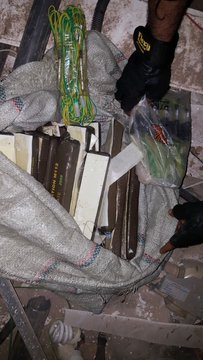
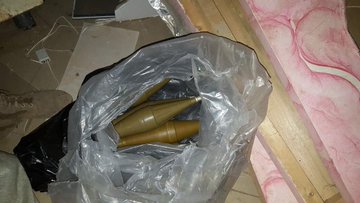
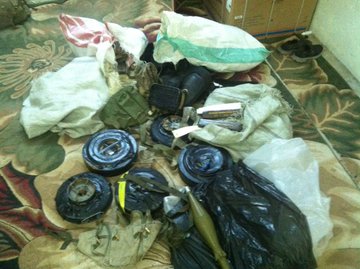
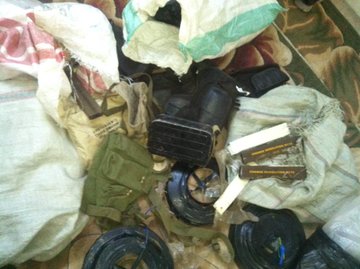
 Attacks on Islah began after the appointment of Abdul-Aziz al-Maflahi (Reuters)
Attacks on Islah began after the appointment of Abdul-Aziz al-Maflahi (Reuters) A soldier from the United Arab Emirates stands guard next to a UAE military plane at the airport of Yemen's southern port city of Aden (Reuters)
A soldier from the United Arab Emirates stands guard next to a UAE military plane at the airport of Yemen's southern port city of Aden (Reuters)
No comments:
Post a Comment